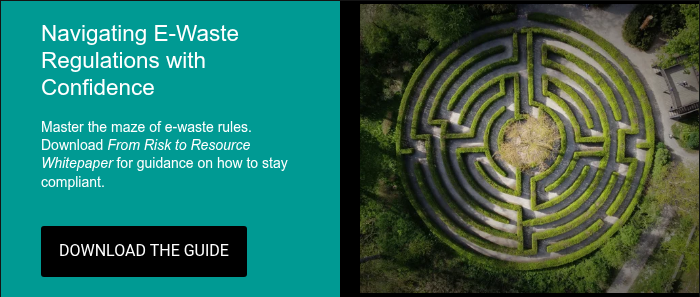The conversation around e-waste regulation has been building, from new national laws to international agreements reshaping how used electronics move across borders. Our latest infographic brings these developments into focus, capturing the scale of the challenge, the latest rule changes, and the global patchwork of requirements that organizations must navigate.
A Turning Point in Global E-Waste Regulation
At the center of the conversation is a pivotal change: the 2022 E-Waste Amendment to the Basel Convention. For the first time, all e-waste exports, hazardous or not, require prior informed consent from the importing country.
By setting the old and new rules side by side, this amendment closes loopholes and raises the bar for compliance. With full enforcement in place since January 2025, all export now undergo the same level of scrutiny as hazardous waste.

The Patchwork Challenge
Global e-waste regulation varies widely, although currently 81 countries, representing 72% of the world’s population, now regulate e-waste — although their approaches vary widely.
Some, like Malaysia, Japan, and China, impose stricter requirements than Basel’s minimum standards. Others operate under lighter regimes but still mandate permits, tracking, and reporting. For businesses managing IT assets internationally, this creates a complex and shifting compliance landscape where each jurisdiction has its own playbook.
The Stakes of Non-Compliance
The risks, shown in the infographic, are significant:
- Legal penalties, including fines and possible imprisonment
- Public reporting of violations under Basel obligations
- Disruption to shipments through seizure, return, or destruction
In today’s environment, a single compliance lapse can have lasting operational and reputational consequences.
From Complexity to Opportunity
The final section of the infographic points to a proactive path forward. With global reach and local expertise, SK Tes helps organizations navigate regulatory complexity, reducing risk, streamlining approvals, and ensuring Basel compliance in every market.
When handled strategically, e-waste compliance becomes more than a legal obligation. It strengthens customer trust, improves operational efficiency, and recovers value from retired IT assets, turning risk into resource.
Get the Complete Picture
Download our free white paper for a visual breakdown of the numbers, the changes, and the opportunities in e-waste regulations and find out how your organization can stay ahead.
Get in touch with us, contact us.
See how SK Tes can help you today
can have more text under in paragraph style.






